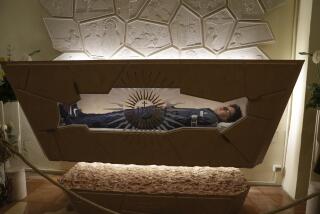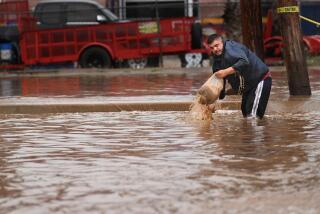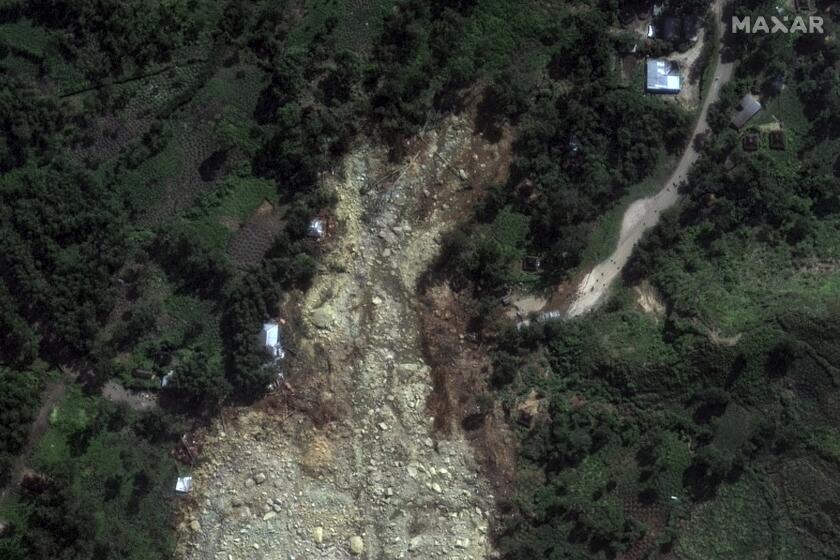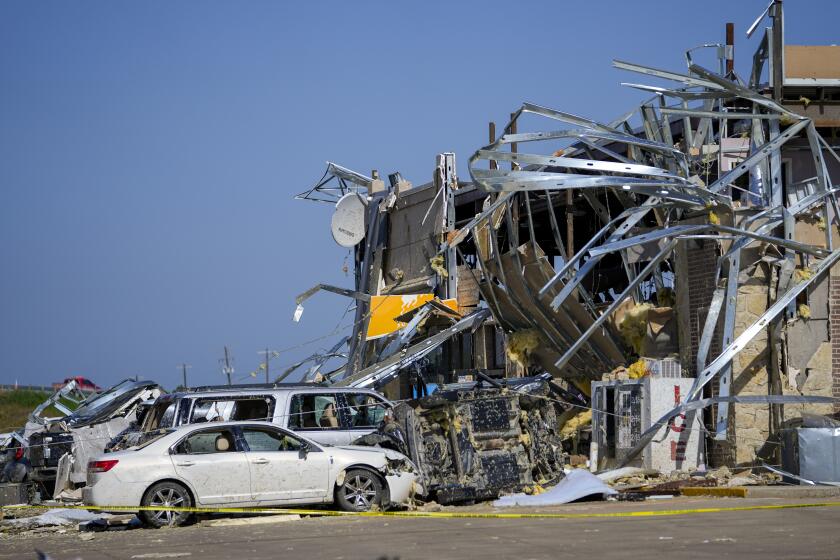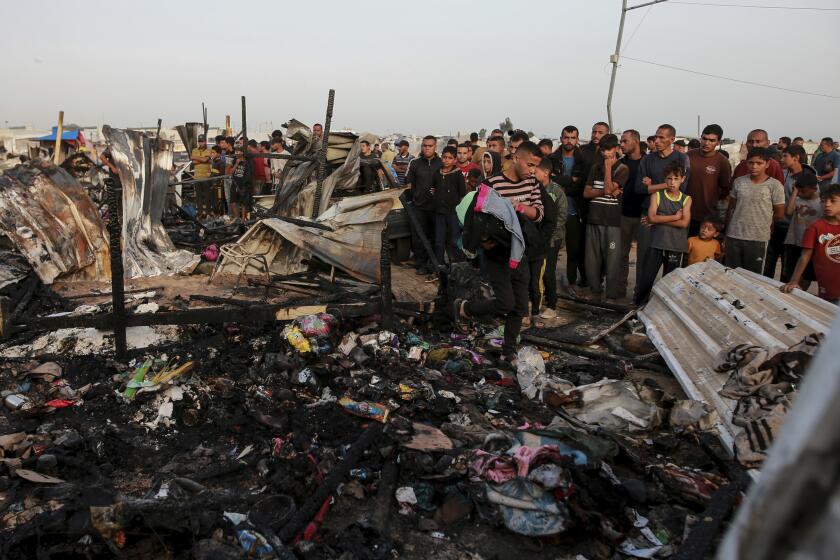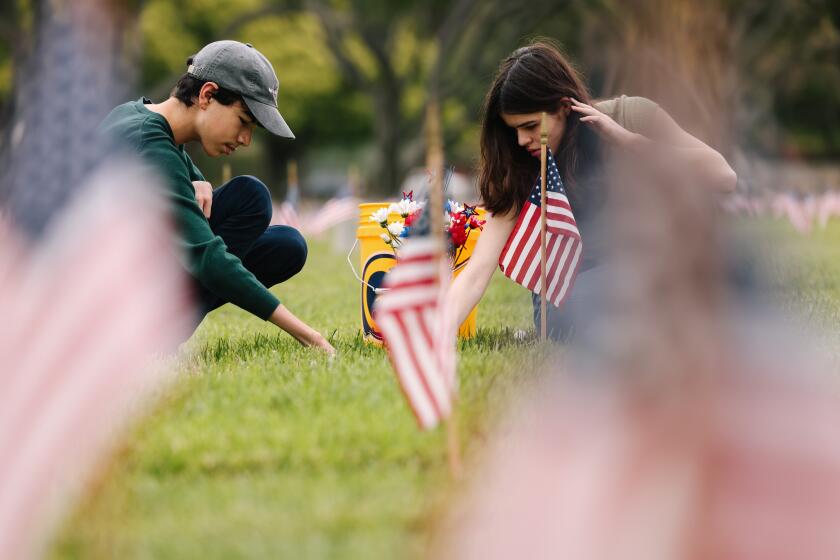After Hussein Refuses to Attend, Trial Resumes and Adjourns
Saddam Hussein refused to sit through testimony Wednesday by survivors of his government’s prisons, delaying the hearing for five hours before the judges agreed to excuse him.
With seven co-defendants present but the deposed leader’s chair empty, the court heard two anonymous witnesses speak from behind a curtain about their brutal interrogations in the early 1980s. Chief Judge Rizgar Mohammed Amin then adjourned the trial for two weeks.
Like all seven previous witnesses, the two men who testified Wednesday offered nothing to link Hussein directly to the crimes of which he and the other defendants are accused -- the slayings of 146 Dujayl residents and the torture of scores of others after shots were fired at the Iraqi president’s motorcade in the village in 1982.
The day’s most potentially damaging testimony -- from a witness who placed one of the defendants, Hussein’s former intelligence chief, at the scene of a torture session -- proved under questioning by the bench to be hearsay.
After five days of proceedings, it is unclear how the prosecution will attempt to prove Hussein’s “command responsibility” for the collective punishment of the villagers that witnesses have described in horrific detail. But officials of the Iraqi High Tribunal say that weeks or even months of testimony lie ahead.
Hussein’s threat to boycott Wednesday’s session was the boldest gambit yet in a defense strategy to attack the U.S.-backed court’s legitimacy and slow the trial, which has now been recessed three times since it started Oct. 19.
Amin had adjourned Tuesday’s session by overruling defense objections to reconvening Wednesday. Hussein then shouted, “I will not come to an unjust court! Go to hell!”
On Wednesday morning, with no defendants present, defense lawyers told the court’s three prosecutors and five trial judges in closed session that the 68-year-old former president indeed intended to stay away.
In recent trials for crimes against humanity, such boycotts have been common. The trials usually proceed without the defendants present, although former Yugoslav President Slobodan Milosevic has often delayed his ongoing war crimes trial in The Hague by citing illness.
The Iraqi judges appeared determined to press on without Hussein, even at the risk of fueling his argument that the process is stacked against him. For Hussein, the risk was losing the televised platform he has exploited with gusto to denounce the judges as servants of the United States.
“I thought Saddam was doing quite well until he skipped class today,” said Leila Nadya Sadat, an international criminal law expert at Washington University in St. Louis.
As talks dragged past the lunch hour, court officials said, the judges and defense lawyers backed away from a confrontation: Rather than stage an outright boycott, Hussein would join the closed session, ask permission to skip the public testimony and be allowed to do so.
“He was very polite,” chief prosecutor Jaafar Mousawi said later, after Hussein had made a three-minute speech to the bench and been escorted back to his jail cell.
“Saddam did not boycott, but he was allowed to stay out of the hearing on the basis of a certain request,” said the court’s chief investigative judge, Raid Juhi, without elaborating on the request. He said the settlement reflected the court’s effort to balance the rights of defendants and those of victims.
Hussein promised to attend the next session, Mousawi said.
Even before Hussein’s actions, court officials had expected the trial to be adjourned Wednesday until after Iraq’s Dec. 15 election of a new parliament. They said security details devoted to the trial in Baghdad’s fortified Green Zone would be redeployed to help protect the polls against Iraq’s insurgency.
This week’s testimony by Shiite Muslim villagers reflected sectarian tensions that help drive the current conflict between Sunni Muslim Arab insurgents, many of them loyal to Hussein, and a Shiite-led government backed by U.S. troops.
The two men who testified Wednesday said they had been rounded up with hundreds of other Dujayl residents after the assassination attempt and beaten during four years of detention. The men described crowded, windowless cells, sickening food, and drinking water so hot it seemed boiled.
But two key elements of the first witness’ testimony fell apart under cross-examination.
The witness said he was at the headquarters of Hussein’s Baath Party in Dujayl when his interrogator turned to Barzan Ibrahim Hasan, the former president’s half brother and chief of intelligence, and asked, “What shall we do with him?”
“Take him. He might be useful,” the witness said Hasan replied, ordering him transferred to a detention center in Baghdad where many from Dujayl reportedly died. It was the first time testimony tied a defendant so directly to the treatment of Dujayl detainees.
Hasan stood up to object. Under questioning by Amin, the witness acknowledged that he was blindfolded at the time and believed it was Hasan speaking only because other prisoners had told him so.
The judge did not rule whether that hearsay evidence was admissible. Under Iraqi law, he is free to consider it. But the witness’ reversal clearly weakened the case against Hasan.
Challenged by Khalil Dulaimi, a lawyer for Hussein, the same witness also recanted his assertion in a pretrial deposition that he had seen a fellow prisoner from Dujayl tortured to death.
Hasan acknowledged that he had gone to Dujayl to investigate the assassination attempt but said his position as head of intelligence did not give him authority over security police who made the arrests. “I am not a jailer,” he said, speaking as if he were still part of the government. “I am a political official.”
Switching to the role of victim, Hasan made his own complaints about prison conditions. He has been held by the U.S. military since April 2003, shortly after Hussein’s ouster.
“I am detained by one of the wealthiest countries in the world, and it was only after four months they started to give us cigarettes -- one of the worst kind in the world,” he said, drawing a look of resignation on Amin’s face. “Next, the food given to us -- I have lost 17 kilograms [37 pounds]. The food is very bad. No one can eat it.”
*
Times special correspondent Suhail Ahmad in Baghdad and staff writer Henry Weinstein in Los Angeles contributed to this report.
More to Read
Start your day right
Sign up for Essential California for news, features and recommendations from the L.A. Times and beyond in your inbox six days a week.
You may occasionally receive promotional content from the Los Angeles Times.

